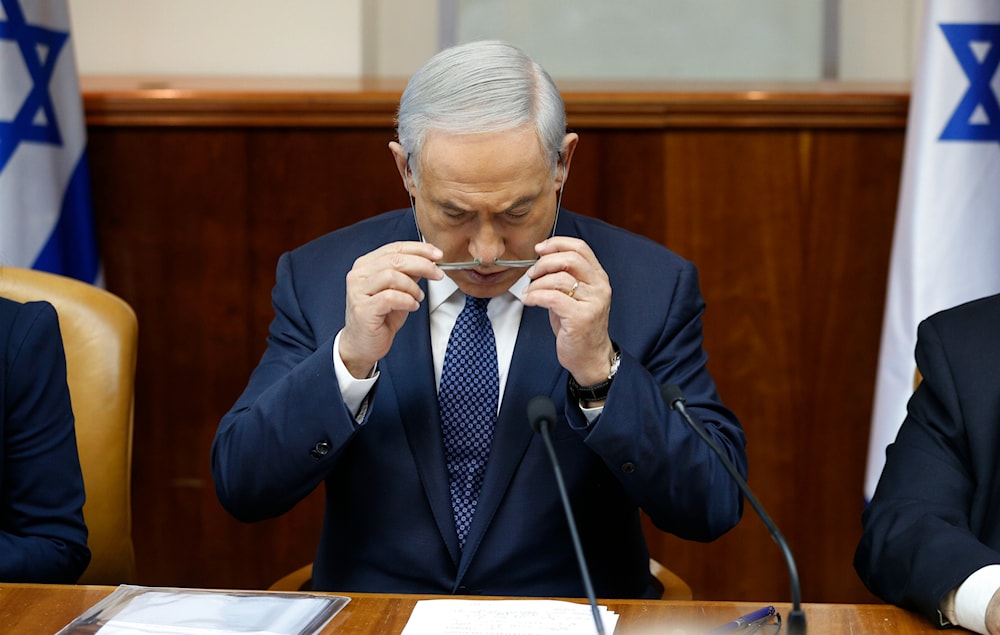Netanyahu insists on 'war goals', proves falsity of Biden's claims
Hamas calls out Netanyahu for his insistence on continuing the genocidal war on Palestinians, despite a UNSC resolution adopting a ceasefire proposal.
-

Israeli Prime Minister Benjamin Netanyahu attends the weekly cabinet meeting in occupied al-Quds, occupied Palestine, on January 3, 2016. (AP)
Israeli Prime Minister Benjamin Netanyahu shut down all talks, especially from Washington, about the Israeli government's willingness to agree to a prisoner exchange deal with the Palestinian Resistance that would ensure a lasting ceasefire.
Netanyahu participated in an extensive interview with Israeli broadcaster Channel 14 on Sunday where he stressed his insistence on "eliminating" Hamas and his outright rejection of a prisoner exchange deal that would see a long-term ceasefire come into effect in the besieged territory.
"I am not ready to stop the war and leave Hamas intact, we will make a deal and complete the goal of destroying Hamas," the Israeli prime minister said.
Netanyahu said that he is ready for "a partial deal that will bring some of the hostages home," however, he insisted on resuming the war on Gaza afterward.
On the Israeli prime minister's intent to continue waging the genocidal war on the Palestinian people, the Palestinian Resistance Movement - Hamas pointed to the clear disparities between Netanyahu's statements and the claims of US President Joe Biden, who said that "Israel" had agreed to a US-sponsored ceasefire proposal.
Hamas said that the position that Netanyahu outlaid in the interview "confirms the continuity of the genocidal war against unarmed civilians in the Gaza Strip."
The movement stressed that Netanyahu only desires a "partial agreement" that allows the Israeli occupation to retake some of its captives.
"It is a clear affirmation of his [Netanyahu's] rejection of the recent UN Security Council resolution and the proposals of US President Joe Biden, contrary to what the US administration attempted to market as an alleged [Israeli approval of the proposal]," Hamas stated.
Netanyahu even went on to assert the Israeli occupation's plans to "eliminate Hamas" on multiple occasions. He said that the occupation's military will continue to maintain "military control" of the Gaza Strip to complete its "demilitarization" and the establishment of a government under the "management of moderate countries in the region."
Read more: Majority of Israeli setters doubt 'total victory over Hamas': Poll
Netanyahu's crazed government eyes war with Lebanon
On the issue of the Northern Front with Lebanon, Netanyahu said that after the aggression on Rafah ends, the Israeli occupation "will move north," referring to Lebanon and Hezbollah.
The Israeli prime minister brushed off real threats facing vital Israeli infrastructure when questioned on the matter.
"We are prepared for the possibility of damage to the electricity facilities and I cannot elaborate on that," he said.
Netanyahu also stuck out Israeli demands for the withdrawal of Lebanese Resistance fighters and forces away from the Lebanese-Palestinian border, saying that if an agreement is reached with Hezbollah it would see the supposed "physical removal of Hezbollah from the border," adding that the Israeli government would have to enforce such a clause.
However, the Resistance's leaders and top Lebanese officials have categorically rejected the possibility of such an event, stressing the Resistance's dedication to protecting Lebanon and its inherit roots in South Lebanon.
Netanyahu also refused to elaborate on Israeli military plans on the Northern Front, only saying that the occupation would do "what is necessary."
Read more: Resistance to know no bounds if Lebanon attacked: Sayyed Nasrallah
Top US general warns against war with Hezbollah
"Israel's" ally the United States has attempted to mediate a deal between the two sides, however, the Resistance has reiterated on multiple occasions the intrinsic relation between the continuation of the war on Gaza and the cessation of operations in support of Palestine from South Lebanon.
Despite the risk of confrontations escalating into an all-out war, Netanyahu and other Israeli leaders continue to provoke a dangerous scenario by threatening war on Lebanon.
The issue has raised alarms in Washington, as the Chairman of the Joint Chiefs of Staff, General Charles Q. Brown explained to reporters in Botswana.
He said that an Israeli wide-scale attack on Lebanon would risk an Iranian response, triggering a broader war that could put US forces in the region in danger.
Brown stressed that the US would not likely be able to help "Israel" defend itself against a broader war with Hezbollah in Lebanon, as well as it did in April back when Iran responded to an attack on its embassy in Damascus.
The general said that the US will continue to talk with Israeli leaders and warn them against widening the war in the region, however, the situation remains uncertain, as Israeli Security Minister Yoav Gallant makes a key visit to Washington.
Read more: War with Hezbollah to be 'Israel's' deadliest: 130-page Israeli report

 5 Min Read
5 Min Read








